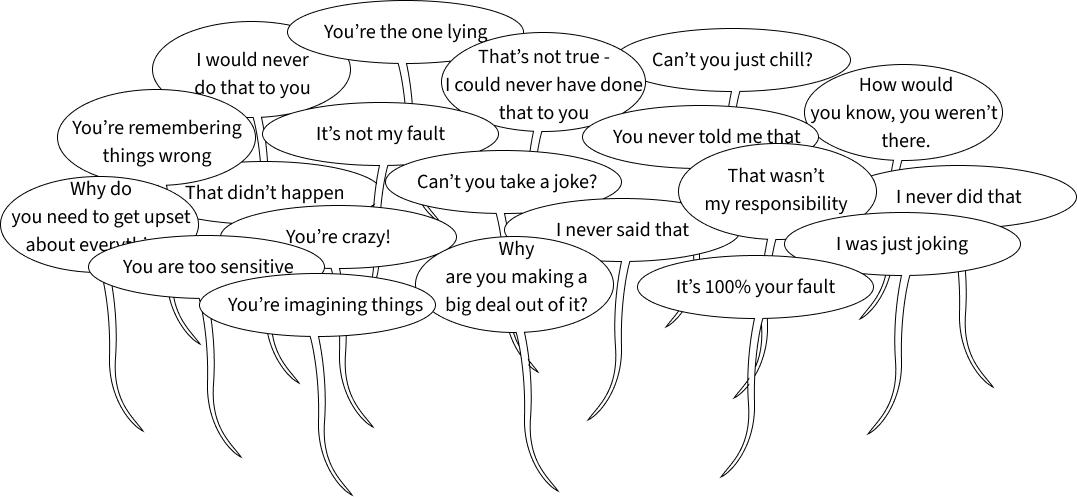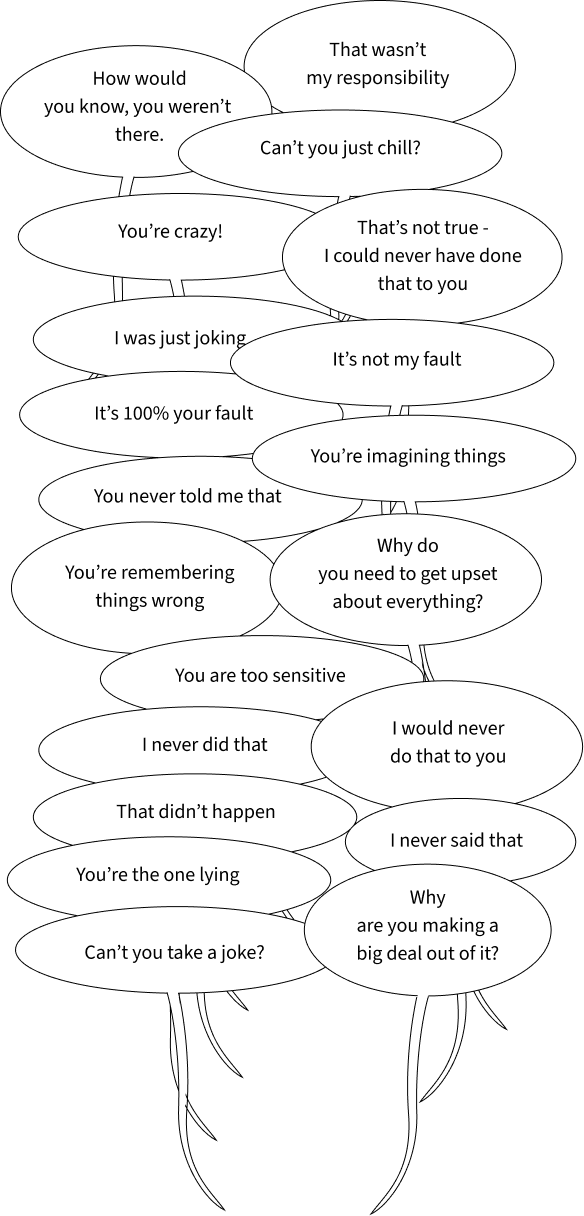
You Are Not Alone!
What Is IPV?
As we navigate the aftermath of intimate partner violence (IPV) and reflect on how we ended up in such situations, it is crucial to understand how these patterns occur so that we can recognize them more easily.
This page gives a brief explanation about the different types of IPV, warning signs, and practical examples of how IPV can manifest in our lives.


You Are Not Alone!

What Is IPV?
As we navigate the aftermath of intimate partner violence (IPV) and reflect on how we ended up in such situations, it is crucial to understand how these patterns occur so that we can recognize them more easily.
This page gives a brief explanation about the different types of IPV, warning signs, and practical examples of how IPV can manifest in our lives.
This page may also be helpful for someone who is experiencing IPV, so feel free to direct them to this website if you think they could benefit from this information.
While we focus on women and nonbinary folks, it’s important to know that IPV can happen to anyone. It is a pervasive issue that can impact anyone, regardless of ethnicity, gender, socio-economic status, age, race, or sexual orientation. However, women are more likely to experience intimate partner violence than men; in fact one in four women and one in nine men experience severe physical violence from an intimate partner. 9 out of 10 cases, the abuser is a man, and the abused is a woman.
Remember, anyone can become a victim of intimate partner violence, and it is never the victim's fault! If you or someone you know is experiencing intimate partner violence, it is crucial to seek help and support. Check out the Resources page.





Types of IPV
Many think that intimate partner violence (IPV) only involves physical or sexual harm, but it is more than that. We also talk about intimate partner violence when someone hurts, manipulates or controls their partner in a relationship. IPV can happen to anyone, regardless of age or gender. It can involve physical harm, such as hitting or kicking, as well as emotional harm, including insults, threats, controlling behavior, and isolating a partner from family and friends. There are other types of IPV which may overlap and are interconnected.
There are various types of intimate partner violence or abuse.
Verbal Abuse
Verbal Abuse is using hurtful words to belittle, control, or scare someone, which can lead to emotional harm, pain, and lowered self-esteem. This can manifest in
Insulting or belittling someone regularly. For example, calling them names or mocking their intelligence or appearance
Baiting or intentionally provoking someone in order to shame them
Yelling or screaming in an intimidating or threatening manner
Constantly criticizing or undermining someone’s confidence. For example, telling them they are worthless or incapable, or that they are not good enough
Threatening harm or consequences to control behavior. For example, ‘If you leave me, you’ll regret it’
Gaslighting or manipulating someone into questioning their memory, sanity, or perception. For example, ‘That never happened, you're imagining things’
Humiliating or embarrassing someone in front of others, or making degrading comments in public or social settings
Using guilt, blame, or shame to manipulate and control someone. For example, ‘It’s your fault, you always ruin things’
Physical Abuse
Physical Abuse means using force or hurt to control your partner, which can often lead to injuries. This can be
Hitting
Slapping
Pushing
Kicking
Spitting
Damaging personal property, for example, destroying items such as someone’s phone or furniture
Throwing objects at someone
Blocking or stopping someone from leaving
Sexual Abuse
Sexual Abuse is forcing or pressuring someone into sexual acts without their consent. This may mean
Forcing someone to have sex against their will
Touching someone inappropriately without their consent, including groping or unwanted physical contact
Pressuring someone into sex by threatening them. For example, ‘If you don’t, I’ll leave you’
Making sexual comments or gestures that make someone uncomfortable, including cat-calling, sexual jokes, or lewd gestures
Using drugs or alcohol to make someone unable to consent to sexual activity, including spiking someone’s drink
Financial Abuse
Financial Abuse restricts a partner's access to money or resources, creating power and dependence to make it difficult to leave the relationship. This can include
Taking someone’s money without permission, hiding their credit cards or using them without consent, or stealing cash and other valuables
Running up debt in someone else’s name, for example, opening credit accounts or taking out loans without their knowledge
Forcing someone to hand over their paycheck or savings
Preventing a partner from working or earning money
Controlling all household spending and financial decisions, deciding what the partner can or cannot buy
Monitoring every financial transaction, tracking purchases or demanding receipts in order to intimidate someone
Withholding money for basic needs like food, clothing, or healthcare
Psychological Abuse
Psychological Abuse uses fear and intimidation to hurt a partner’s feelings, control their thoughts, feelings, or actions, and make them feel trapped, powerless, or worthless
Constant criticism, blame, or name calling, for example, ‘It’s your fault everything goes wrong’
Making the victim feel fearful, for example, ‘I’m always watching you’
Threatening harm to the victim or their loved ones, for example, ‘If you leave me, I’ll hurt your family’
Threatening to expose private information to shame or humiliate the victim
Diminishing their accomplishments, for example, ‘You’ll never be good enough’
Gaslighting or denying events to make the victim doubt their reality
Emotional manipulation or abuse, for example, ‘No one else will ever love you’, or ‘If you really loved me, you’d do this’
Baiting or intentionally upsetting the victim in order to provoke a reaction
Spiritual Abuse
Spiritual Abuse uses religion or spiritual beliefs to control, dominate or repeatedly harm the other partner or their religious feelings. This can mean
Mocking or criticizing the victim’s beliefs and lowering their confidence
Limiting the victim’s access to spiritual resources, for example, preventing them from attending worship services or speaking to faith leaders
Forcing someone to change their religion
Claiming that leaving the abuser would violate religious principles
Questioning the victim’s faith or accusing them of being unfaithful to their religion
Technological Abuse
Technological Abuse uses technology to facilitate IPV or gender based violence (GBV) and can be just as harmful as in person abuse. Women (especially bisexual, queer, indigenous, and other marginalized communities) experience more frequent and greater harm than men. Tactics include
Doxing: releasing personal information about someone to the internet that could be embarrassing, personally revealing, or result in harm to the victim. Doxing is not necessarily illegal, but the ramifications can be far reaching
Flaming (can also be known as roasting): Posting insults, often including profanity, on the internet
Cyberstalking: Repeatedly using technology to track, harass, or threaten someone. This can include constant messaging, tracking someone’s location, or monitoring their online activity
Revenge Porn: Sharing intimate photos or videos of someone without their consent to shame, control, or harm them. This can have serious emotional, social, and legal consequences




Tactics of IPV
There are tactics such as baiting or gaslighting that are often used as ways of manipulation and can be linked to verbal or psychological abuse.
Baiting
Baiting refers to when a toxic person intentionally says or does something that they know will hurt or upset you. This typically means rude or cruel comments or condescending remarks. The purpose of baiting is to provoke a reaction from you, make you feel inferior, or start drama and arguments.
Do not take the bait! People who bait are often controlling and can be subtly abusive. They don’t care how negatively it may affect the person they are baiting. In fact, that’s exactly why they do it: to provoke a reaction so that they can blame you for feeling hurt or reacting.
Gaslighting
Gaslighting is when the abuser manipulates the victim into questioning their own memory, reality, or sanity. Over time, it can destroy the victim’s confidence and make them more dependent on the abuser for validation, continuing the cycle of control and abuse. Gaslighting often happens gradually, making it harder to recognize and more dangerous. Recognizing it can help victims regain control.
Denying events: ‘I never said that, you’re making this up’
Blaming the victim: ‘You’re overreacting, this is 100% your fault’
Twisting the story: ‘That’s not what happened, you’re remembering it wrong’
Shifting blame: ‘You’re the one who started this. I only reacted to what you did.’
Destabilizing reliance on memory: ‘Are you sure you’re not imagining things? I don’t think that happened.’
What Gaslighting Sounds Like

What Gaslighting Looks Like
It often feels like you’re never right, no matter the situation
You might feel like you aren't allowed to express how you really feel
They’ll deny saying or doing things, even when you have clear proof
They might accuse you of actions or behaviors that they are guilty of
They can turn people against you, isolating you from your support system
You may hear them say things that make you feel like you’re losing your mind
You are walking on eggshells
You find yourself constantly defending what you know to be true
Over time, your trust in yourself can really start to fade
They try to make you question your own thoughts and feelings
Many people end up journaling or recording their experiences just to have proof that things actually happened
Recognizing these signs can be the first step towards reclaiming your truth and wellbeing.

This page may also be helpful for someone who is experiencing IPV, so feel free to direct them to this website if you think they could benefit from this information.
While we focus on women and nonbinary folks, it’s important to know that IPV can happen to anyone. It is a pervasive issue that can impact anyone, regardless of ethnicity, gender, socio-economic status, age, race, or sexual orientation. However, women are more likely to experience intimate partner violence than men; in fact one in four women and one in nine men experience severe physical violence from an intimate partner. 9 out of 10 cases, the abuser is a man, and the abused is a woman.
Remember, anyone can become a victim of intimate partner violence, and it is never the victim's fault! If you or someone you know is experiencing intimate partner violence, it is crucial to seek help and support. Check out the Resources page.
Types of IPV
Many think that intimate partner violence (IPV) only involves physical or sexual harm, but it is more than that. We also talk about intimate partner violence when someone hurts, manipulates or controls their partner in a relationship. IPV can happen to anyone, regardless of age or gender. It can involve physical harm, such as hitting or kicking, as well as emotional harm, including insults, threats, controlling behavior, and isolating a partner from family and friends. There are other types of IPV which may overlap and are interconnected.
There are various types of intimate partner violence or abuse.
Verbal Abuse
Verbal Abuse is using hurtful words to belittle, control, or scare someone, which can lead to emotional harm, pain, and lowered self-esteem. This can manifest in
Insulting or belittling someone regularly. For example, calling them names or mocking their intelligence or appearance
Baiting or intentionally provoking someone in order to shame them
Yelling or screaming in an intimidating or threatening manner
Constantly criticizing or undermining someone’s confidence. For example, telling them they are worthless or incapable, or that they are not good enough
Threatening harm or consequences to control behavior. For example, ‘If you leave me, you’ll regret it’
Gaslighting or manipulating someone into questioning their memory, sanity, or perception. For example, ‘That never happened, you're imagining things’
Humiliating or embarrassing someone in front of others, or making degrading comments in public or social settings
Using guilt, blame, or shame to manipulate and control someone. For example, ‘It’s your fault, you always ruin things’
Physical Abuse
Physical Abuse means using force or hurt to control your partner, which can often lead to injuries. This can be
Hitting
Slapping
Pushing
Kicking
Spitting
Damaging personal property, for example, destroying items such as someone’s phone or furniture
Throwing objects at someone
Blocking or stopping someone from leaving
Sexual Abuse
Sexual Abuse is forcing or pressuring someone into sexual acts without their consent. This may mean
Forcing someone to have sex against their will
Touching someone inappropriately without their consent, including groping or unwanted physical contact
Pressuring someone into sex by threatening them. For example, ‘If you don’t, I’ll leave you’
Making sexual comments or gestures that make someone uncomfortable, including cat-calling, sexual jokes, or lewd gestures
Using drugs or alcohol to make someone unable to consent to sexual activity, including spiking someone’s drink
Financial Abuse
Financial Abuse restricts a partner's access to money or resources, creating power and dependence to make it difficult to leave the relationship. This can include
Taking someone’s money without permission, hiding their credit cards or using them without consent, or stealing cash and other valuables
Running up debt in someone else’s name, for example, opening credit accounts or taking out loans without their knowledge
Forcing someone to hand over their paycheck or savings
Preventing a partner from working or earning money
Controlling all household spending and financial decisions, deciding what the partner can or cannot buy
Monitoring every financial transaction, tracking purchases or demanding receipts in order to intimidate someone
Withholding money for basic needs like food, clothing, or healthcare
Psychological Abuse
Psychological Abuse uses fear and intimidation to hurt a partner’s feelings, control their thoughts, feelings, or actions, and make them feel trapped, powerless, or worthless
Constant criticism, blame, or name calling, for example, ‘It’s your fault everything goes wrong’
Making the victim feel fearful, for example, ‘I’m always watching you’
Threatening harm to the victim or their loved ones, for example, ‘If you leave me, I’ll hurt your family’
Threatening to expose private information to shame or humiliate the victim
Diminishing their accomplishments, for example, ‘You’ll never be good enough’
Gaslighting or denying events to make the victim doubt their reality
Emotional manipulation or abuse, for example, ‘No one else will ever love you’, or ‘If you really loved me, you’d do this’
Baiting or intentionally upsetting the victim in order to provoke a reaction
Spiritual Abuse
Spiritual Abuse uses religion or spiritual beliefs to control, dominate or repeatedly harm the other partner or their religious feelings. This can mean
Mocking or criticizing the victim’s beliefs and lowering their confidence
Limiting the victim’s access to spiritual resources, for example, preventing them from attending worship services or speaking to faith leaders
Forcing someone to change their religion
Claiming that leaving the abuser would violate religious principles
Questioning the victim’s faith or accusing them of being unfaithful to their religion
Technological Abuse
Technological Abuse uses technology to facilitate IPV or gender based violence (GBV) and can be just as harmful as in person abuse. Women (especially bisexual, queer, indigenous, and other marginalized communities) experience more frequent and greater harm than men. Tactics include
Doxing: releasing personal information about someone to the internet that could be embarrassing, personally revealing, or result in harm to the victim. Doxing is not necessarily illegal, but the ramifications can be far reaching
Flaming (can also be known as roasting): Posting insults, often including profanity, on the internet
Cyberstalking: Repeatedly using technology to track, harass, or threaten someone. This can include constant messaging, tracking someone’s location, or monitoring their online activity
Revenge Porn: Sharing intimate photos or videos of someone without their consent to shame, control, or harm them. This can have serious emotional, social, and legal consequences
Tactics of IPV
There are tactics such as baiting or gaslighting that are often used as ways of manipulation and can be linked to verbal or psychological abuse.
Baiting
Baiting refers to when a toxic person intentionally says or does something that they know will hurt or upset you. This typically means rude or cruel comments or condescending remarks. The purpose of baiting is to provoke a reaction from you, make you feel inferior, or start drama and arguments.
Do not take the bait! People who bait are often controlling and can be subtly abusive. They don’t care how negatively it may affect the person they are baiting. In fact, that’s exactly why they do it: to provoke a reaction so that they can blame you for feeling hurt or reacting.
Gaslighting
Gaslighting is when the abuser manipulates the victim into questioning their own memory, reality, or sanity. Over time, it can destroy the victim’s confidence and make them more dependent on the abuser for validation, continuing the cycle of control and abuse. Gaslighting often happens gradually, making it harder to recognize and more dangerous. Recognizing it can help victims regain control.
Denying events: ‘I never said that, you’re making this up’
Blaming the victim: ‘You’re overreacting, this is 100% your fault’
Twisting the story: ‘That’s not what happened, you’re remembering it wrong’
Shifting blame: ‘You’re the one who started this. I only reacted to what you did.’
Destabilizing reliance on memory: ‘Are you sure you’re not imagining things? I don’t think that happened.’
What Gaslighting Sounds Like

What Gaslighting Looks Like

It often feels like you’re never right, no matter the situation
You might feel like you aren't allowed to express how you really feel
They’ll deny saying or doing things, even when you have clear proof
They might accuse you of actions or behaviors that they are guilty of
They can turn people against you, isolating you from your support system
You may hear them say things that make you feel like you’re losing your mind
You are walking on eggshells
You find yourself constantly defending what you know to be true
Over time, your trust in yourself can really start to fade
They try to make you question your own thoughts and feelings
Many people end up journaling or recording their experiences just to have proof that things actually happened
Recognizing these signs can be the first step towards reclaiming your truth and wellbeing.
The Cycle of Violence
The Cycle of Violence usually includes four phases: tension building up, incident, reconciliation or calm phase, and honeymoon.
In the first phase, tension builds as the abuser becomes increasingly annoyed and irritated, leading to an explosive incident that can turn violent. After the incident, there’s a calm phase where both partners might try to reconnect, often giving the illusion that things are improving, creating a false sense of hope for change in the abuser. The cycle concludes with the honeymoon phase, where the abuser might shower affection, making it tough for the victim to break free, only for the cycle to start all over again.
Femicide and IPV
Femicide is the intentional killing of women or girls because of their gender, and the most extreme form of violence against women. Many cases are linked to the escalation of IPV with the accumulation of long-term physical, emotional, or psychological abuse in intimate relationships.
Forms of femicide may include
Intimate Partner Violence (IPV)
Honor Killings
Dowry-related murders
Links to human trafficking or organized crime
Perpetrators often kill their partners over jealousy, possessiveness, or fear of losing control of them. Warning signs include prior incidents of IPV, threats, stalking, and coercive control.
Societal and systemic issues that contribute to this include gender norms, lack of legal protections, and failure to intervene or recognize warning signs.
What To Say To Survivors

While someone may genuinely want to help, many phrases that might seem harmless or straightforward can actually be incredibly hurtful to a victim. Instead, use phrases that are non-judgmental and allow the survivor to feel better supported and empowered.
I believe you!
I’m here to listen if you want to talk.
What can I do to help?
I care about you.
It’s not your fault.
You are not responsible for his behaviour.
You are strong and brave for reaching out.
I’m here for you.
You deserve safety, love, and respect.
It’s alright to take time to figure things out.
I’m proud of you.
I’m willing to explore some options with you if you’d like.
I will support you no matter what.
What Not To Say To Survivors

The following examples should be avoided, as they can blame the victim, dismiss their emotions, and undermine the support they need.
Why don’t you just leave?
How can you love someone like that?
Why do you apologize all the time?
Why didn’t you tell anyone before?
Why didn’t you tell me sooner?
It’s not that bad.
Don’t be so dramatic.
You’re overreacting.
At least he didn’t hit you.
He’s your husband, he can’t rape you.
You should’ve known better than to go out with him.
But he’s always so nice to me.
I was just joking. Can’t you take a joke?
I would never let it get this bad if I were in your place.
He probably didn’t mean to hurt you.
How can you not see it? It happens over and over because it’s a cycle.
You should forgive him.
I don’t believe you.
Are you sure you’re not imagining things?
Why don’t you just call the police?
Why do you keep going back?
But you don’t look like you’ve been abused.
That bruise doesn’t even look that bad.
You should stay strong for the kids.
Why don’t you just defend yourself?
They’ll change.
What did you do to provoke him?
Oh, I thought he loved you.
You’re not the only one who goes through tough times.
Just get over it.
The Cycle of Violence
The Cycle of Violence usually includes four phases: tension building up, incident, reconciliation or calm phase, and honeymoon.
In the first phase, tension builds as the abuser becomes increasingly annoyed and irritated, leading to an explosive incident that can turn violent. After the incident, there’s a calm phase where both partners might try to reconnect, often giving the illusion that things are improving, creating a false sense of hope for change in the abuser. The cycle concludes with the honeymoon phase, where the abuser might shower affection, making it tough for the victim to break free, only for the cycle to start all over again.


Femicide and IPV
Femicide is the intentional killing of women or girls because of their gender, and the most extreme form of violence against women. Many cases are linked to the escalation of IPV with the accumulation of long-term physical, emotional, or psychological abuse in intimate relationships.
Forms of femicide may include
Intimate Partner Violence (IPV)
Honor Killings
Dowry-related murders
Links to human trafficking or organized crime
Perpetrators often kill their partners over jealousy, possessiveness, or fear of losing control of them. Warning signs include prior incidents of IPV, threats, stalking, and coercive control.
Societal and systemic issues that contribute to this include gender norms, lack of legal protections, and failure to intervene or recognize warning signs.
What To Say To Survivors

While someone may genuinely want to help, many phrases that might seem harmless or straightforward can actually be incredibly hurtful to a victim. Instead, use phrases that are non-judgmental and allow the survivor to feel better supported and empowered.
I believe you!
I’m here to listen if you want to talk.
What can I do to help?
I care about you.
It’s not your fault.
You are not responsible for his behaviour.
You are strong and brave for reaching out.
I’m here for you.
You deserve safety, love, and respect.
It’s alright to take time to figure things out.
I’m proud of you.
I’m willing to explore some options with you if you’d like.
I will support you no matter what.

What Not To Say To Survivors

The following examples should be avoided, as they can blame the victim, dismiss their emotions, and undermine the support they need.
Why don’t you just leave?
How can you love someone like that?
Why do you apologize all the time?
Why didn’t you tell anyone before?
Why didn’t you tell me sooner?
It’s not that bad.
Don’t be so dramatic.
You’re overreacting.
At least he didn’t hit you.
He’s your husband, he can’t rape you.
You should’ve known better than to go out with him.
But he’s always so nice to me.
I was just joking. Can’t you take a joke?
I would never let it get this bad if I were in your place.
He probably didn’t mean to hurt you.
How can you not see it? It happens over and over because it’s a cycle.
You should forgive him.
I don’t believe you.
Are you sure you’re not imagining things?
Why don’t you just call the police?
Why do you keep going back?
But you don’t look like you’ve been abused.
That bruise doesn’t even look that bad.
You should stay strong for the kids.
Why don’t you just defend yourself?
They’ll change.
What did you do to provoke him?
Oh, I thought he loved you.
You’re not the only one who goes through tough times.
Just get over it.



